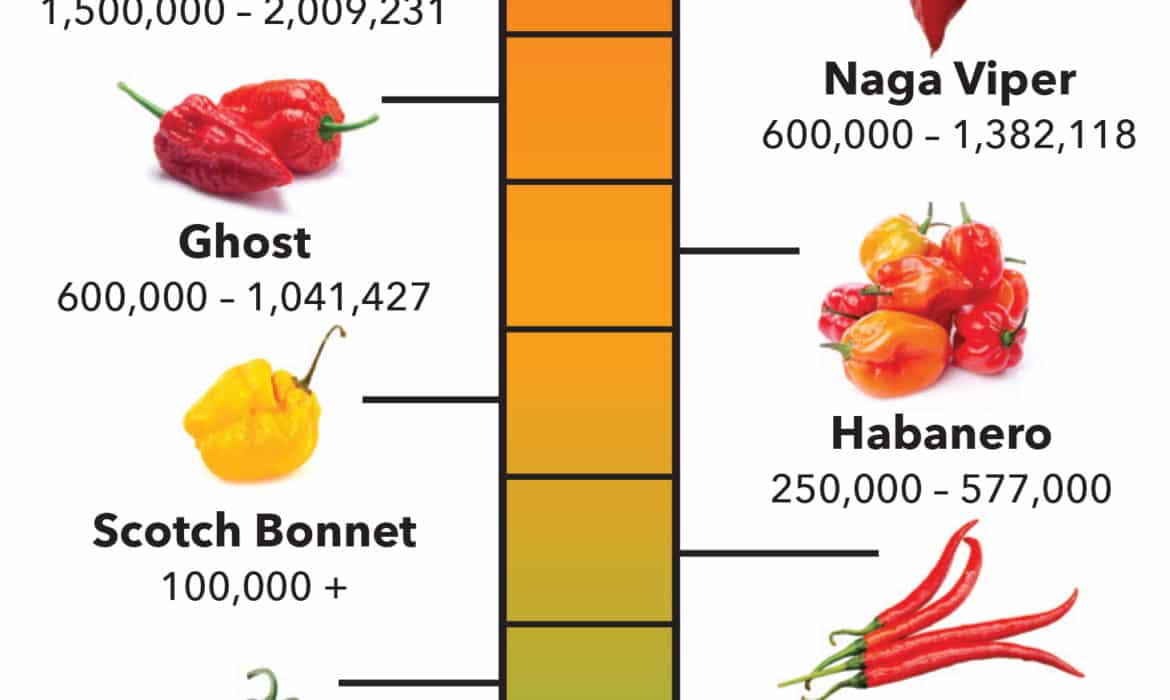Pungent chili peppers can boost metabolism, providing health benefits
Carolina Reaper. Komodo Dragon. Devil’s Tongue Red. These are some of the hottest chili peppers in the world. Pungent chili peppers all contain a plant compound called capsaicin that’s responsible for their heat — and for the health benefits of hot peppers.
Capsaicin is present in all peppers. The spicier the pepper, the more capsaicin it contains. Sweet bell peppers, for example, contain very little, if any, capsaicin.
If you can take the heat, capsaicin offers numerous health benefits. This popular compound is widely used in medicine and pharmacotherapy for a variety of health reasons, including as an anti-cancer agent.
Animal studies have shown that capsaicin has favorable effects on cardiovascular health, metabolic syndrome, diabetes, obesity, nonalcoholic fatty liver disease, and stroke risk. That’s largely due to capsaicin’s anti-inflammatory effects, which may promote vascular health and decrease some of the immune cell responses that drive hardening of the arteries and heart attacks.
Measuring the heat
Food scientists measure the heat in chili peppers by diluting ground chili peppers and sugar in water; the hotter the pepper, the more water it takes to diminish the heat on the palate of taste testers. The results are recorded in heat units on the Scoville scale, created in 1912 by Wilbur Scoville, an American pharmacologist.
The Scoville method is subjective, so scientists often use another form of capsaicin testing, called high performance liquid chromatography, in which ground chilis are diluted in a solvent, passed through a detector, and plotted on a chromatogram.

Hotter peppers are not necessarily better, as extremely spicy food can cause stomach irritation, nausea, diarrhea, or even fainting.
“If you haven’t been consuming spicy foods, consider starting at the lower end of the spice spectrum,” Haas says.
Metabolism boosters
Eating hot peppers may slightly boost metabolism, supplementing weight loss efforts.
“Capsaicin has the potential to modulate metabolism,” says Lara Field, RDN, owner and founder of FEED Nutrition Consulting in Chicago. Clinical studies have shown that capsaicin impacts metabolic rate by slightly enhancing energy expenditure, while boosting fat oxidation and diminishing appetite, Field says.
A recent large-scale analysis of nine studies revealed that overweight people who consumed capsaicin had an increase in energy expenditure of approximately 70 calories per day and showed an increase in fat oxidation or fat-burning capacity. Capsaicin also may stimulate the digestive tract, as well as enhance the absorption of micronutrients.
Hot peppers may also aid in controlling appetite by helping people feel full. According to a study in the journal Appetite, participants who took capsaicin supplements during a 12-week study reported consuming 284 fewer calories per day.
“Research points to many benefits, including the management of obesity and [being] overweight thanks to capsaicin’s satiety benefits and slight metabolic boost,” Haas says.
Although research has shown that capsaicin may modestly boost metabolic rate, it is by no means a magic weight-loss elixir. “Capsaicin may be responsible for a brief metabolism boost. Don’t expect a long-term [metabolic] boost,” Haas says. Eating capsaicin-rich peppers along with a balanced diet of other fruits and vegetables and getting regular physical activity can enhance weight-control efforts.
Capsaicin also has antioxidant and anti-inflammatory properties, which can help in the prevention of cancers, as well as many chronic diseases.
Hot chili peppers contain anti-oxidants — such as vitamins C, E, and carotenoids that easily convert to vitamin A — which help the body fend off cell damage. By keeping cells healthy, the immune system can more robustly fight off viruses, bacteria, and cancer-causing cells.
While capsaicin supplements are available, taking a supplement is different than eating the plant food, as plants offer many other beneficial compounds.
Taste bud tantalizers
Cuisines from all over the world — from Asia to the Mediterranean, from the Caribbean to Cajun country — use hot peppers to flavor their food. Home cooking can take on a whole new flair with spicy peppers.
So many options make it easy to include hot peppers in home cooking, but keep in mind that the spice level is most effective when it’s palate pleasing. Start small with hot peppers in the kitchen to ascertain an adequate tolerance level.
Field recommends using chili pepper by adding the ground spice to salad dressings, marinades, or even as part of a barbecue rub. “Give a little boost to your egg dishes, chili, soups, or stews,” she says. “Toss a dash on fresh produce such as cucumber, jicama, or even pineapple or mango — with a squirt of lime juice and dash of salt — for a zesty change of pace.”
Heat advisory
Just make sure you proceed with caution when it comes to hot peppers. “Before you indulge in hot chili peppers, proceed slowly and understand how much heat your body can take,” Haas says.
One person may easily tolerate very hot habanero peppers, but the mild heat from a jalapeño pepper may be too much for someone else. Know your own heat threshold, as well as any health issues that spicy foods may aggravate, such as gastrointestinal reflux disease (GERD).
“Hot foods can be difficult to tolerate,” Field says. “Those with GERD may have difficulty tolerating too much hot pepper, and it may exacerbate symptoms. Enjoy in moderation.”
It’s also important to note that capsaicin may temporarily elevate blood pressure, which can interfere with blood thinners and blood pressure medications.
“Speak to your physician and a registered dietitian nutritionist first, especially if you have any health conditions or are on any medications,” Haas says.
Plant foods, such as chili peppers, can be powerful players in overall health. The good news is that there are varying levels of heat in chili peppers, so you can choose the level that’s right for you but doesn’t put you in the hot seat.
Originally published in the Fall/Winter 2021 print issue.

Vicki is a registered dietitian nutritionist, lifestyle nutrition expert, writer, culinary and media consultant and author of two books.










